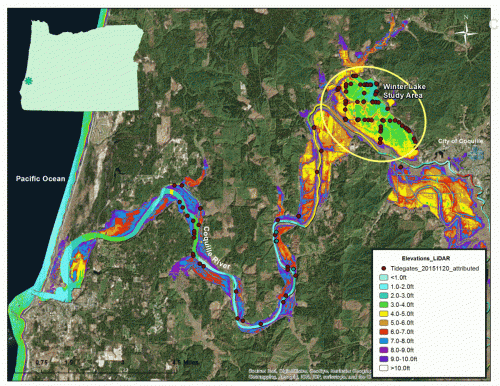Current Consultancy Projects

Valley floodplain wetland habitats are critical for overwintering of nomad and downstream migrating presmolt Coho. However, human settlement of the US west coast has resulted in loss of tidal saline, freshwater, and non-tidal freshwater critical rearing habitats, including in the Coquille River valley floodplain. From 1880 to 1950 ~95% of these habitats were diked, tidegated, and drained. In the Coquille, river floodplain tidal and non-tidal wetlands historically comprised at least 12,000 acres and perhaps as much as 17,000 acres. Currently, there is ~1,000 acres remaining. To partially address this decline and assist salmon recovery, two large-scale restoration actions will occur in the Winter Lake area of the Coquille River valley located at River Mile (RM) 22.0 in 2016/17.
The restoration occurring at Winter Lake is expected to provide several benefits to native salmonids, including (but not limited to)
- Increase in use of restored area by juvenile Coho (and other native species).
- Increase in habitat quality as measured by increased over-winter survival and increased growth/condition of juveniles prior to outmigration.
- Increased survival of juvenile Coho from smolt to returning adult.
- Decrease in non-native fish abundance and diversity
- Increase in the contribution of lower river rearing sites to adult returns in the basin
The REDD group is helping design the monitoring program to asses the effectiveness of this project- click here for the full proposal